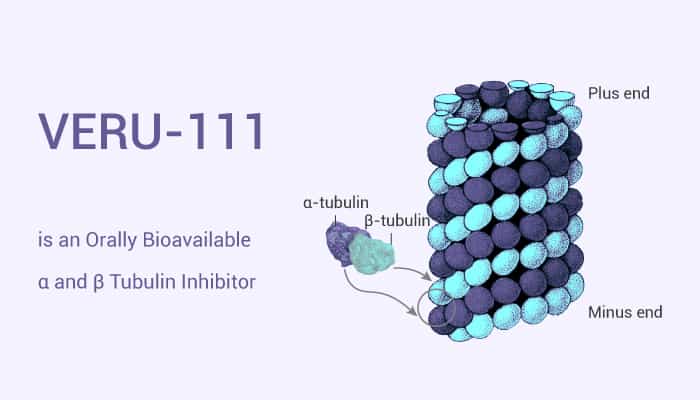Tubulins play a major role in cell dynamics, thus are important molecular targets for cancer therapy. VERU-111 preferentially represses clinically important, βIII and βIV tubulin isoforms via restoring the expression of miR-200c. VERU-111 (ABI-231) displays optimum activity and has an average IC50 value of 5.2 nM against a large panel of cancer cell lines. Additionally, VERU-111 efficiently inhibits tumorigenic and metastatic characteristics of PanCa cells.

VERU-111 arrests the cell cycle in the G2/M phase and induced apoptosis in PanCa cell lines via modulation of cell cycle regulatory (Cdc2, Cdc25c, and Cyclin B1) and apoptosis-associated (Bax, Bad, Bcl-2, and Bcl-xl) proteins. Moreover, VERU-111 treatment also inhibits tumor growth in a PanCa xenograft mouse model. As a result, VERU-111 effectively inhibits growth and metastatic phenotypes of PanCa cells in in vitro and in vivo model systems.
VERU-111 inhibits the growth and clonogenic potential of PanCa cells. VERU-111 inhibits the growth of PanCa cells in a dose and time-dependent manner. The IC50s are 25, 35, and 35 nM in Panc-1, AsPC-1 and HPAF-II, respectively after 24 h treatment, while 48 h post-treatment it was 11.8, 15.5, and 25 nM. In addition, VERU-111 significantly reduces the cell index in a dose-dependent manner compared to vehicle-treated cells. VERU-111 (1.25–5 nM) treatment significantly reduces the number of colonies in a dose-dependent manner as compared to respective control groups.
All in all, ABI-231 is a potent, orally bioavailable tubulin inhibitor that interacts with the colchicine binding site and is currently undergoing clinical trials for prostate cancer.